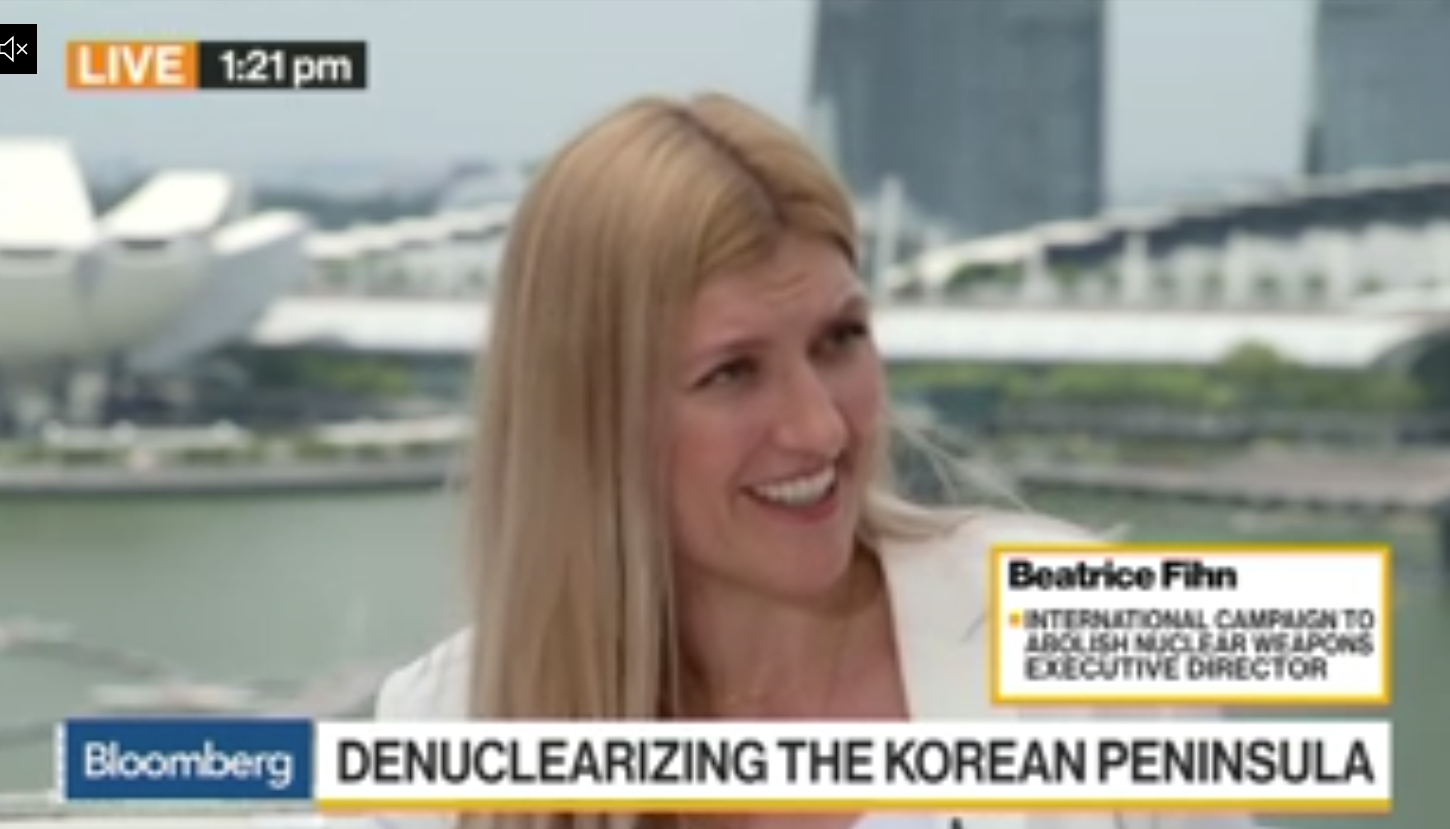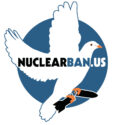 MONDAY, 11 June: At a press conference in Singapore this morning, ahead of the historic meeting between Kim Jong-un and Donald Trump, Beatrice Fihn, Executive Director of the International Campaign to Abolish Nuclear Weapons (ICAN), unveiled a 5-Step ‘Roadmap’ for the denuclearization of the Korean Peninsula.
MONDAY, 11 June: At a press conference in Singapore this morning, ahead of the historic meeting between Kim Jong-un and Donald Trump, Beatrice Fihn, Executive Director of the International Campaign to Abolish Nuclear Weapons (ICAN), unveiled a 5-Step ‘Roadmap’ for the denuclearization of the Korean Peninsula.
“Our roadmap answers the question at the heart of negotiations,” said Fihn. “How do North and South Korea denuclearize in a way that is verifiable, irreversible and won’t unravel?”
Experts agree that even a limited nuclear engagement on the Korean Peninsula could involve the use of as many as 30 nuclear warheads, causing massive loss of life and cataclysmic environmental damage in North and South Korea, as well as the entire Northeast Asia region. Any solution to the crisis requires all parties to reject nuclear weapons outright on humanitarian grounds, through the existing Treaty on the Prohibition of Nuclear Weapons (TPNW).
The Treaty on the Prohibition of Nuclear Weapons is the central point of the denuclearization plan. Joining the Treaty would oblige North Korea to immediately cease any development, production, and manufacture of nuclear weapons. The plan also calls on South Korea, who has not had nuclear weapons on their soil since the early 1990s, to also comply with the TPNW, by formally rejecting the United States’ extended nuclear deterrence ‘guarantee.’
For its part, the US would need to take a practical step towards denuclearization by finally following through on its commitment to ratify the Comprehensive Test Ban Treaty (CTBT). The CTBT provides the security and certainty needed to verify that no nuclear testing will take place anywhere in the world. But it cannot come into effect until it has been ratified by the US and 7 other nations.
“Denuclearizing through ICAN’s proposed plan would reinforce efforts to formally end the Korean War and build a lasting peace,” said Akira Kawasaki of ICAN’s International Steering Group.
ICAN is a coalition of non-governmental organizations in over one hundred countries, that was awarded the Nobel Peace Prize in 2017 for its “groundbreaking efforts to achieve a treaty-based prohibition” of nuclear weapons. The Treaty on the Prohibition of Nuclear Weapons (TPNW) was adopted by 122 nations at the United Nations on July 7, 2017.
ICAN worked in secret consultation with over 30 experts from the international sector, nuclear agencies, academia, humanitarian organizations and the diplomatic corps to develop a clear, practical and realistic plan for the denuclearization of the Korean Peninsula. Several organizations and individuals provided confidential input as they lacked an official mandate for such an undertaking, but felt it was important a plan be presented leading into the historic talks in Singapore.
The full Korean Peninsula Denuclearization Framework is available here: http://www.icanw.org/wp-content/uploads/2018/06/ICAN-Korean-Peninsula-Denuclearization-Roadmap.pdf
Latest ICAN updates from Singapore can be found here: http://www.icanw.org/singapore-summit/
Message from Korean hibakushato the negotiators in Singapore is here: https://www.facebook.com/peaceboat/videos/1947869931912325/







The Treaty on the Prohibition of Nuclear Weapons is a great tool to strengthen the norm against nuclear weapons and the collective action of States that join. But it is a misfit for the North East Asia nuclear weapons situation.
It is puzzling that ICAN has rejected realistic proposals for denuclearization of North Korea, such as the 3+3 proposal for a North East Asia Nuclear Weapon Free Zone which already has considerable support amongst parliamentarians, academics, mayors and civil society in Japan and South Korea and genuine interest from North Korea. Instead ICAN calls on North Korea to join the Treaty on Prohibition of Nuclear Weapons, a non-starter for the region.
Neither North Korea nor any of the other relevant countries (Japan, South Korea, China, Russia, USA), support the TPNW. North Korea already withdrew from the NPT because they believed that nuclear deterrence had become important to deter an attack against them from the West. In order for them to abandon nuclear deterrence, they will need security assurances that they won’t be invaded. The TPNW does not provide such security assurances.
From the US side, they will not support the TPNW as the framework for North Korea to give up nuclear weapons as it provides no verification or enforcement measures, and provides no capacity for input into the process by other States that are not parties to the TPNW. In addition, the TPNW has no agency for implementation, and has not even entered into force.
By all means promote the TPNW in areas where it can have impact. But to put it forward as the tool to facilitate nuclear disarmament in the Korean peninsula is counter-productive to the diplomatic and political process required to ensure denuclearisation of the peninsula, and discredits both the treaty and those promoting it.
Hi Alyn,
You claim that the TPNW is a ‘misfit’, a ‘non-starter’ and even ‘counter-productive’ as a tool for facilitating the de-nuclearization of the Korean Peninsula. And yet you seem to think a North East Asia Nuclear Weapon Free Zone is somehow more ‘realistic’? You know perfectly well that the governments of Japan, US, S Korea, N Korea and other players in the region do not support a NE Asia NFZ anymore than they support the TPNW at the moment. So that proposal is also a ‘non-starter’ if your starting point is what certain governments currently think.
Yes, as things stand at the moment, the US government will ‘never’ agree to give North Korea the security assurances they want until North Korea agrees to verification and enforcement of their nuclear disarmament. And North Korea will ‘never’ agree to give up their nuclear weapons until they have cast-iron security assurances that they will not be invaded by the US. That is an impasse that cannot be solved without challenging the basic assumptions upon which those positions rest.
And the most basic assumption of all, inherent in every word uttered by the current US president, is that the US not only has the unique and inalienable right to possess nuclear weapons indefinitely, but that it also has the unique and inalienable right to make sure other countries, like North Korea, for instance, do not possess those weapons. The proposal for a 3+3 NE Asia NFZ, at least the one that I’ve seen, does not challenge that assumption at all, but in fact reinforces it by explicitly recognizing the US, China and Russia as nuclear weapon states who together would guarantee the security of North Korea, South Korea and Japan as non-nuclear weapon states. Do you seriously think that kind of arrangement is going to move us towards a nuclear-free world, let alone be accepted by those 6 states as things stand at the moment??
You can criticize the TPNW all you want, for ‘not providing security assurances’, ‘providing no verification or enforcement measures’, ‘providing no capacity for outside input’, ‘having no agency for implementation’. What the TPNW represents is the categorical and unequivocal rejection of nuclear weapons by the overwhelming majority of states and global civil society. That is a solid foundation for changing the way certain governments currently think. Until those governments start really feeling the pressure from the rest of the world (and from their own citizens) to change their thinking on nuclear weapons, you are just kidding yourself if you think they are going to take other disarmament measures any more seriously than they have done for the last several decades.
It’s time to stop criticizing the TPNW and join the movement, Alyn! Whether you like it or not, it’s our last, best hope to get rid of these weapons once and for all.